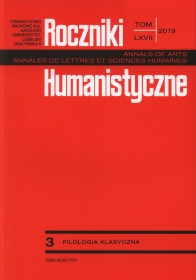Officina medici philosophi schola est. Terapia słowami (casus Erazma z Rotterdamu)
Abstrakt
Artykuł jest poświęcony związkom retoryki, filozofii i medycyny. Pierwsza jego część dotyczy greckich (zwłaszcza sofistycznych) korzeni zależności zachodzących między tymi dziedzinami, procesów przenikania topiki medycznej do literatury antycznej i zasad wzajemnych oddziaływań. Celem tej krótkiej prezentacji jest ukazanie podłoża i znalezienie uzasadnienia dla faktu częstej obecności terminologii lekarskiej i wątków medycznych w dyskursie retorycznym doby nowożytnej, zwłaszcza w humanistycznej literaturze o tematyce filozoficznej, nastawionej na terapię werbalną i przekonanej o leczniczym wymiarze słowa. Przypadek Erazma z Rotterdamu uznano za szczególnie ciekawy dla tych rozpoznań, stąd twórczość tego właśnie humanisty stała się przedmiotem badań w niniejszej pracy. Zwrócono zatem uwagę na bogatą reprezentację motywów lekarskich w dziełach Rotterdamczyka, na obecność w tekstach autora obrazowania, terminologii i topiki medycznej, na szerokie zainteresowanie dziedziną medycyny, czego wyrazem są odwołania do prac Galena i tłumaczenia jego pism przez Erazma. Najważniejszy i najciekawszy jednak okazał się ten tekst, w którym nomenklatura lekarska stała się estetycznym i ideowym komponentem, wpłynęła na kształt całego dyskursu, jego płaszczyznę argumentacyjną, oddziaływała na perswazyjną tkankę dzieła, a zarazem brała udział w budowaniu jego filozoficznej wymowy. Do tego rodzaju pism należy Lingua – apologetyczne dzieło Erazma o wyraźnie dydaktycznej wymowie, a zarazem silnie przeniknięte epideiktyczną manierą sofistycznej diatryby.
Bibliografia
Dąbkowska-Kujko J., „Lingua” Erazma z Rotterdamu a diatryba, w: „Sława z dowcipu sama wiecznie stoi...”. Prace ofiarowane Pani Profesor Alinie Nowickiej-Jeżowej z okazji siedemdziesięciolecia urodzin i pięćdziesięciolecia pracy naukowej, red. M. Hanusiewicz-Lavallee, W. Pawlak, Lublin: Wydawnictwo KUL 2018, s. 57-68.
Dąbkowska-Kujko J., „Lingua” Erazma z Rotterdamu między fizjologią, filozofią i filologią, „Poznańskie Studia Polonistyczne. Seria Literacka” 2017, 31(51), s. 129-146.
Elaut L., Èrasme traducteur de Galien, „Bibliotheque d’Humanisme et Renaissance” 20(1958), nr 1, s. 36-43.
Erasmus Roterodamus, Księgi, które zową Język, z łacińskiego na polski wyłożony, Kraków: H. Wietor, 1542.
Erasmus Roterodamus, Lingua. Opus novum et hisce temporibus aptissimum, [Cracoviae: H. Wietor, 1526].
Gasbarra S., „Lingua, quo vadis?” Language and Community in Erasmusʼs „Lingua”, „Viator. Medieval and Renaissance Studies” 22(1991), s. 343-355.
Gilbert C., When did a Man in the Renaissance grow old?, „Studies in the Renaissance” 14(1967), s. 7-32.
Gill Ch., Ancient Psychotherapy, „Journal of the History of Ideas” 46(1985), nr 3, s. 307-325.
Gorgiasz, Pochwała Heleny, przeł. K. Tuszyńska, „Przegląd Humanistyczny” 28(1984), nr 3(222), s. 109-113.
Hodges D., Renaissance Fictions of Anatomy, Amherst : University of Massachusetts Press 1985.
Huizinga J., Erasmus and the Age of Reformation, trans. by F. Hopman, Mineola‒New York: Dover Publications 2001.
Jaeger W., Paideia. Formowanie człowieka greckiego, przeł. M. Plezia, H. Bednarek, Warszawa: Aletheia 2001.
Krivatsy P., Erasmus’ medical milieu, „Bulletin of the History of Medicine” 47(1973), nr 2, s. 113-154.
Leach J., Healing and the Word. Hippocratic Medicine and Sophistical Rhetoric in Classical Antiquity, Pittsburgh: University of Pittsburgh 1996.
Lipsius Iustus, De constantia libri duo, qui alloquium praecipue continent in publicis malis, Antverpiae: ex officina Christophori Plantini, 1584.
Lipsjusz Justus, O stałości księgi dwoje, barzo rozkoszne i użyteczne. Teraz świeżo z łacińskiego na rzecz polską przełożone i annotacyjami krótkimi objaśnione przez Janusza Piotrowicza, Wilno: drukarnia Jana Karcana, 1600.
Mazzio C., Sins of the Tongue in Early Modern England, „Modern Language Studies” 28(1998), nr 3-4, s. 93-124.
Nerczuk Z., „Pochwała Heleny” Gorgiasza z Leontinoi, „Studia Antyczne i Mediewistyczne” 10(45)(2012), s. 17-36.
Nussbaum M., The Therapy of Desire. Theory and Practice in Hellenistic Ethics, Princeton: Princeton University Press 1994.
Opus epistolarum Des[iderii] Erasmi Roterodami, edidit P.S. Allen, t. I-XII, Oxonii 1906-1958.
Phillips M.M., Erasmus on the Tongue, „Erasmus of Rotterdam Society Yearbook” 1(1981), nr 1, s. 113-125.
Phillips M.M., The „Adages” of Erasmus, Cambridge: Cambridge University Press 1964.
Piasecka M., „Lingua” Erazma z Rotterdamu w staropolskim przekładzie. Warsztat pracy tłumacza w XVI wieku, Warszawa: Wydawnictwo Naukowe PWN 2017.
Rief J.J., Searching for the good life. Rhetoric, Medicine and the shaping of Lifestyle, rozprawa doktorska (University of Pittsburgh 2012), http://d-scholarship.pitt.edu/16842/1/RiefETD Revised.pdf (dostęp: 8.11.2018).
Roth A.D., Reciprocal Influences between Rhetoric and Medicine in Ancient Greece, rozprawa doktorska (University of Iowa 2008), https://ir.uiowa.edu/etd/3/ (dostęp: 8.11.2018).
Sawday J., The Body Emblazoned. Dissection and the Human Body in Renaissance Culture, London: Routledge 1995.
Segal Ch.P., Gorgias and the Psychology of Logos, „Harvard Studies in Classical Philology” 66(1962), s. 99-155.
Struever N.S., The Discourse of Cure. Rhetoric and Medicine in the Late Renaissance, w: Rhetoric and Pedagogy. Its History, Philosophy and Practice, ed. W.B. Horner and M. Leff, New York–London: Routledge 1995, s. 277-293.
Szawarski Z., Mądrość i sztuka leczenia, Gdańsk: Słowo/Obraz Terytoria 2005.
Thomas-Pollei K.A., Disciplining Medicine. Science and the Rhetoric of Medical Education Reform in Britain, 1770-1858, rozprawa doktorska (University of Minnesota 2012), https://conservancy.umn.edu/handle/11299/139703 (dostęp: 8.11. 2018).
Tosam M.J., The Role of Philosophy in Modern Medicine, „Open Journal of Philosophy” 4(2014), nr 1, s. 75-84.
Wesoły M., Mowy epidejktyczne Gorgiasza: „Pochwała Heleny” i „Obrona Palamedesa”, „Humaniora. Czasopismo Internetowe” 2014, nr 4(8), s. 11-35.
Copyright (c) 2019 Roczniki Humanistyczne

Utwór dostępny jest na licencji Creative Commons Uznanie autorstwa – Użycie niekomercyjne – Bez utworów zależnych 4.0 Międzynarodowe.





